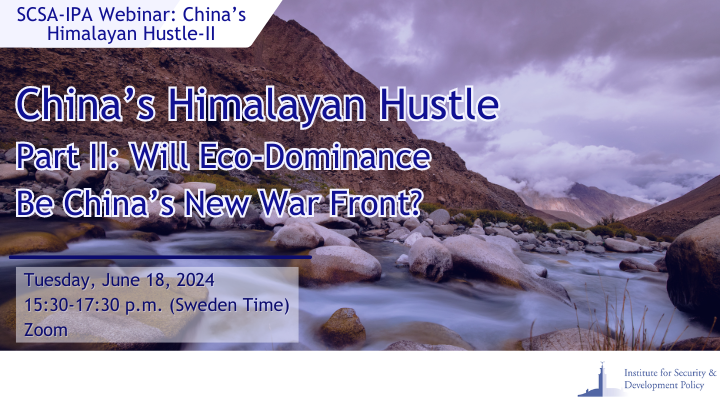China’s Himalayan Hustle – Part II: Will Eco-Dominance Be China’s New War Front?

Did you miss this webinar? The full recording is available on ISDP’s YouTube channel.
Today, ecological sustainability is a key aspect of battling not only climate change but also scarcity of critical natural resources. Undoubtedly, water has become the world’s scarcest critical resource – an irreplaceable one at that. Many reports, including by the European Commission, have already highlighted that the ramifications of climate change in tandem with growing populations will create fertile conditions for intense competition and conflicts for limited natural resources. The water crisis in particular would be bigger, with life-threatening consequences, than the current global energy crisis and the difficult shift to greener energy.
Against such a scenario, China’s continued efforts to develop a Sino-centric trans-Himalayan ecosystem with a focus on its national security interests are of regional and global concern, and not just its rival neighbors like India that compete for the same resources. For example, China’s rapid development of mega hydro-power projects like the plans to build a massive hydropower plant on the Yarlung Tsangpo River in Tibet (also called Brahmaputra River in India) will cause immense ecological devastation, not to mention human displacement in millions. As a result, downstream countries will be affected; some of whom like India and Bangladesh have clear reservations against China’s growing hydro-hegemony.
Similarly, China’s dam building on the Mekong River has blocked the majority of the sediment flowing downstream, which is vital for the ecosystem. This is expected to create major food and water security issues for Southeast Asian countries like Vietnam, as well as repercussions on biodiversity and livelihood. China’s opaque system that does not allow the sharing of information and data on its activities on trans-boundary rivers with relevant countries adds another layer to the issue.
Of course, such hydro, solar, and wind projects by China will aid China in reaching its carbon neutrality objectives, as well as help achieve its long-term goals for the so-called “socialist modernization,” which includes clean energy supply and water resources development plans. At the same time, some of the more prominent political aims of these renewable energy projects in Tibet, for example, include taking complete control over Tibet’s enormous natural resources, as also re-settle Chinese people in the Tibetan territories by displacing Tibetan nomads and farmers from their ancestral lands due to the construction of dams, often without the provision of requisite compensation, let alone proportional benefits.
In all, China’s development projects in the Himalayan region are primarily aimed at securitizing its national interests by exploiting natural resources to meet the Chinese mainland’s growing energy and water demands. In the process, China intends to not only take greater control of the region but also regulate access to basic resources such as water for the neighbors.
Naturally, China’s attempts at controlling regional resources have international implications as they run counter to the basic tenets of a free, open, and rules-based global/Indo-Pacific order. In the wake of the Ukraine war, as China and Russia create greater convergence, the Russian control of the Arctic and China’s growing interest in the Arctic region for its resources will pose problems for the US and the European states. Therefore, the Indo-Pacific stakeholders must create newer ways to combat China’s gluttonous need for natural resources and in turn to conserve the liberal world order ethos.
This webinar, therefore involving some of the finest experts on the subject, aims to examine the extent and impact of water diversification and environmental degradation in the Himalayas due to China’s developmental projects, particularly in the Tibetan Plateau. It also explores China’s Himalayan strategy through its control of natural resources. For such a purpose, the webinar aims to address the following questions:
- In what ways is China expanding its revisionist goals in the trans-Himalayan region through renewable energy projects, including the BRI?
- What are China’s near-term and long-term plans in the Himalayan valley?
- Are China’s mega dams and large-scale renewable energy projects essential for clean energy? Or are they “green washing” initiatives, as a means to a geopolitical end?
- How is China’s modernization plan in Tibet affecting environmental degradation and its control or occupation of the Tibetan territories, language, people, and culture as a whole?
- Does the notion of China as a hydro-hegemon have legitimacy, or is it merely a myth?
- How can the international community, primarily the EU – which considers China a strategic competitor – as well as US – for whom China poses a “pacing,” existential threat – and its regional allies and partners, including India – China’s regional rival that has most to lose in the Himalayas – collaborate to outmaneuver the Chinese strategy for exercising total dominance over resources?
Panelists:
 Dr. Jingdong Yuan is the Director, China and Asia Security Programme at Stockholm International Peace Research Institute. Dr. Yuan’s research focuses on Indo–Pacific security, Chinese foreign policy, Sino–Indian relations, China-EU relations, and nuclear arms control and nonproliferation. He is the co-author of Chinese Cruise Missiles: A Quiet Force-Multiplier (2014) and China and India: Cooperation or Conflict? (2003), and co-editor of Re-engaging China: Can Australia Lead the Way Again (2023), Trump’s America and International Relations in the Indo-Pacific (2021) and Australia and China at 40 (2012). His publications have appeared in Asian Survey, Australian Journal of International Affairs, Contemporary Security Policy, International Affairs, International Journal, Journal of Contemporary China, Journal of International Affairs, Nonproliferation Review, Washington Quarterly, and in many edited volumes.
Dr. Jingdong Yuan is the Director, China and Asia Security Programme at Stockholm International Peace Research Institute. Dr. Yuan’s research focuses on Indo–Pacific security, Chinese foreign policy, Sino–Indian relations, China-EU relations, and nuclear arms control and nonproliferation. He is the co-author of Chinese Cruise Missiles: A Quiet Force-Multiplier (2014) and China and India: Cooperation or Conflict? (2003), and co-editor of Re-engaging China: Can Australia Lead the Way Again (2023), Trump’s America and International Relations in the Indo-Pacific (2021) and Australia and China at 40 (2012). His publications have appeared in Asian Survey, Australian Journal of International Affairs, Contemporary Security Policy, International Affairs, International Journal, Journal of Contemporary China, Journal of International Affairs, Nonproliferation Review, Washington Quarterly, and in many edited volumes.
 Mr. Richard Ghiasy is an advisor and researcher on Asian geopolitics and security, often revolving around China and India. He is the Director of GeoStrat, a boutique geopolitics consultancy in the Netherlands. In his 17-year career, he has provided policy advice to inter alia the EEAS, European Commission and Parliament, Ministries across Europe and Asia, the UN, the World Bank, OSCE, and OECD. He has also presented at several of the world’s top 20 universities. Honed by professional travel in over 75 countries, frequently his work has a conflict-preventive nature. Richard is a Senior Fellow at the Leiden Asia Centre at Leiden University in the Netherlands and a registered expert at the Dutch Government Sinologists Council (CKN).
Mr. Richard Ghiasy is an advisor and researcher on Asian geopolitics and security, often revolving around China and India. He is the Director of GeoStrat, a boutique geopolitics consultancy in the Netherlands. In his 17-year career, he has provided policy advice to inter alia the EEAS, European Commission and Parliament, Ministries across Europe and Asia, the UN, the World Bank, OSCE, and OECD. He has also presented at several of the world’s top 20 universities. Honed by professional travel in over 75 countries, frequently his work has a conflict-preventive nature. Richard is a Senior Fellow at the Leiden Asia Centre at Leiden University in the Netherlands and a registered expert at the Dutch Government Sinologists Council (CKN).
 Dr. Zsuzsa Anna Ferenczy is an Affiliated Scholar at the Department of Political Science of the Vrije Universiteit Brussel (Free University of Brussels), Head of the Associate Network at 9DASHLINE, a fast-growing platform dedicated to offering original comment and analysis on issues affecting the Indo-Pacific, Research Fellow at Taiwan Next Gen Foundation, Expert Consultant on China, Taiwan and the Korean Peninsula of Human Rights Without Frontiers. Currently Zsuzsa conducts research as a Taiwan Fellow hosted by the Ministry of Science and Technology of Taiwan, and is Assistant Professor at the National Dong Hwa University in Hualien. Zsuzsa’s fields of expertise are EU foreign and security policy, European normative power and human rights, EU relations with China and Taiwan in the Indo-Pacific.
Dr. Zsuzsa Anna Ferenczy is an Affiliated Scholar at the Department of Political Science of the Vrije Universiteit Brussel (Free University of Brussels), Head of the Associate Network at 9DASHLINE, a fast-growing platform dedicated to offering original comment and analysis on issues affecting the Indo-Pacific, Research Fellow at Taiwan Next Gen Foundation, Expert Consultant on China, Taiwan and the Korean Peninsula of Human Rights Without Frontiers. Currently Zsuzsa conducts research as a Taiwan Fellow hosted by the Ministry of Science and Technology of Taiwan, and is Assistant Professor at the National Dong Hwa University in Hualien. Zsuzsa’s fields of expertise are EU foreign and security policy, European normative power and human rights, EU relations with China and Taiwan in the Indo-Pacific.
 Ms. Eerishika Pankaj is the Director of Delhi NCR based Organisation for Research on China and Asia (ORCA). She is also an Editorial Assistant to the Series Editor for Routledge Series on Think Asia; a Young Leader in the 2020 cohort of the Pacific Forum’s Young Leaders Program; a Commissioning Editor with E-International Relations for their Political Economy section; a Council Member of the WICCI’s India-EU Business Council and an Emerging Quad Think Tank Leader in the U.S. State Department’s Leaders Lead on Demand program. Primarily a China and East Asia scholar, she recently co-edited the ORCAxISDP Special Issue “The Dalai Lama’s Succession: Strategic Realities of the Tibet Question”.
Ms. Eerishika Pankaj is the Director of Delhi NCR based Organisation for Research on China and Asia (ORCA). She is also an Editorial Assistant to the Series Editor for Routledge Series on Think Asia; a Young Leader in the 2020 cohort of the Pacific Forum’s Young Leaders Program; a Commissioning Editor with E-International Relations for their Political Economy section; a Council Member of the WICCI’s India-EU Business Council and an Emerging Quad Think Tank Leader in the U.S. State Department’s Leaders Lead on Demand program. Primarily a China and East Asia scholar, she recently co-edited the ORCAxISDP Special Issue “The Dalai Lama’s Succession: Strategic Realities of the Tibet Question”.
 Mr. Ryohei Kasai is a Visiting Associate Professor at Center for South Asian Studies, Gifu Women’s University, Japan. He received an MA in International Politics from School of International Politics, Economics, and Business, Aoyama Gakuin University, Japan. Working on international relations of South Asia, modern and contemporary history of Japan-India relations, and Japan’s Asia policy, he teaches these subjects at Komazawa University and Yokohama City University. He previously served as a political researcher/advisor at Japanese Embassies in Beijing, New Delhi, and Islamabad. Since June 2022, he has also been contributing to the Japan-India Association as one of the directors of the board.
Mr. Ryohei Kasai is a Visiting Associate Professor at Center for South Asian Studies, Gifu Women’s University, Japan. He received an MA in International Politics from School of International Politics, Economics, and Business, Aoyama Gakuin University, Japan. Working on international relations of South Asia, modern and contemporary history of Japan-India relations, and Japan’s Asia policy, he teaches these subjects at Komazawa University and Yokohama City University. He previously served as a political researcher/advisor at Japanese Embassies in Beijing, New Delhi, and Islamabad. Since June 2022, he has also been contributing to the Japan-India Association as one of the directors of the board.
Moderator:
 Dr. Jagannath Panda is the Head of the Stockholm Center for South Asian and Indo-Pacific Affairs at the Institute for Security and Development Policy, Sweden. He is a Professor at the Department of Regional and Global Studies at the University of Warsaw, and a Senior Fellow at The Hague Center for Strategic Studies (HCSS) in the Netherlands and an International Research Fellow at the Canon Institute for Global Studies in Japan. Dr. Panda has testified to the US-China Economic and Security Review Commission at the US Congress. He is also the Series Editor for Routledge Studies on Think Asia.
Dr. Jagannath Panda is the Head of the Stockholm Center for South Asian and Indo-Pacific Affairs at the Institute for Security and Development Policy, Sweden. He is a Professor at the Department of Regional and Global Studies at the University of Warsaw, and a Senior Fellow at The Hague Center for Strategic Studies (HCSS) in the Netherlands and an International Research Fellow at the Canon Institute for Global Studies in Japan. Dr. Panda has testified to the US-China Economic and Security Review Commission at the US Congress. He is also the Series Editor for Routledge Studies on Think Asia.